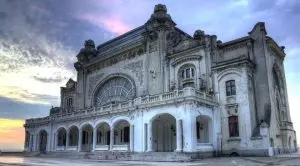 The mayor of Constanta Decebal Fagadau revealed that a third offer for renovation and consolidation of the Constanta Casino building was challenged by one of the bidders. Previously, two other offers organised for the same purpose with the seaside casino, were challenged, too.
The mayor of Constanta Decebal Fagadau revealed that a third offer for renovation and consolidation of the Constanta Casino building was challenged by one of the bidders. Previously, two other offers organised for the same purpose with the seaside casino, were challenged, too.
The Constanta Casino, which is situated at the Romanian seaside, has been in very poor state for years now. The casino, which was built in 1909, is categorised as a historical monument and is one of the emblematic sites for the city of Constanta.
The casino has been out of operation over the last eight years. The last time when some renovation was made there was in 1987. Previously, two offers for the renovation of the casino were organised, one in 2015 and one in 2016, respectively. Approximately €8 million were accumulated as project’s funding.
Third Appeal Blocks Renovation Works Once Again
 The venue’s renovation works, however, cannot start due to the repeated appeals, even provided that the renovation project and the money for it are available. Constanta’s mayor confirmed that the community had been waiting for two years and a half for the project to be given a start, and confirmed that the funding for the project was also available, with VAT having changed a few times since then.
The venue’s renovation works, however, cannot start due to the repeated appeals, even provided that the renovation project and the money for it are available. Constanta’s mayor confirmed that the community had been waiting for two years and a half for the project to be given a start, and confirmed that the funding for the project was also available, with VAT having changed a few times since then.
According to mayor Fagadau, the situation has placed a company that files an appeal in a more favourable position in comparison to the local community or the historical monument, as it has been granted with more rights. The mayor shared that the number of appeals made in terms of the casino renovation project unveiled a reality, in which a certain business could end up having more rights than the casino itself.
The winner for the renovation and consolidation of the Constanta Casino was officially chosen in March, with the rest of the bidders for the project being disqualified. Then, one of the disqualified filed an appeal, which was later rejected. Then a second appeal was made, with the former bidder going further and taking the matter to the National Council for Solving Contestations (CNSC), which also rejected the appeal.
As explained the by mayor, the same company also went on to request the winning bid, because it had the legal right to do so. It opposed to the fact that the bid of the winner had been considered worthy to meet the offer’s requirements. The company made a number of appeals, all of which were rejected. Finally, it was found to be right by a court assembled over the summer holiday. According to mayor Fagadau, a holiday court hardly had the information or the time needed for making a fully-informed decision on the matter.
The large number of appeals and the holiday court’s decision, however, pushed the National Investments Company to officially cancel the offer and restart the process of evaluation. Unfortunately, the former bidder opposed to this decision as well.
According to Mr. Fagadau, a serious change in the legislation concerning the area of public acquisitions is necessary. He also explained that the National Agency for Public Acquisitions (ANAP) has already been considering and discussing a project for such a legislative change.
- Author


